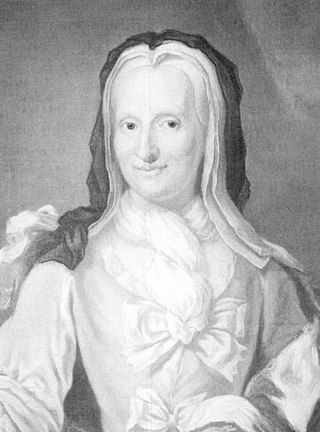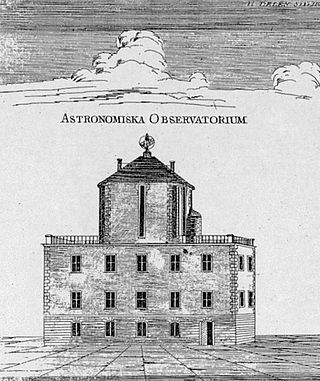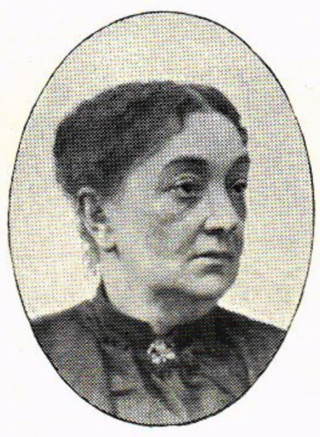
Anna Maria Elvia (20 February 1713 - 8 May 1784), was a Swedish feminist writer.

Anna Maria Elvia (20 February 1713 - 8 May 1784), was a Swedish feminist writer.
She was the daughter of a professor, Petrus Elvius, the sister of the mathematician Per Elvius the Younger and married professor Mårten Strömer in 1757, all active in the Uppsala University. She belonged to the academical world in Uppsala and was given an unusually high education for a contemporary female, such as mathematics, astronomy and several languages including Latin.
She was renowned and respected for her academic abilities. Jonas Lindeblad said of her in 1770, that she was known for her intellectual resources, despite her effort to remain discreet, simply because they could not be hidden.
Elvia regarded intellectual development as not only a right but a duty for a female. This was a controversial idea of her time and she was alongside Hedvig Charlotta Nordenflycht one of few female contemporary writers to express it. She is quoted: "Our sex should make a habit of thus: to learn and to think." (1750). [1]
Catharina Ahlgren was a Swedish proto-feminist poet and publisher, and one of the first identifiable female journalists in Sweden.
Anna Margareta Momma née von Bragner (1702–1772), was a Swedish publisher, chief editor and journalist.
Anna Brita Wendelius, née Ramklou (1741–1804), also known as Wendelia, was a Swedish artist and singer. She was a member of the Royal Swedish Academy of Music and the Utile Dulci.

Dorothea Maria Lösch was a Swedish master mariner, known for the incident during the Russo-Swedish War (1788–1790) in which she commandeered a Swedish ship during a crisis. She was the first female in Sweden to be given the rank of Kapten in the Swedish Navy. Her name has also been spelled Losch and Läsch.
Sophia Schröder was a Swedish soprano, active as a concert vocalist at the royal orchestra, the Kungliga Hovkapellet, at the royal Swedish court, the first of her gender to have been officially given such a position.

Josefina Leontina Amanda Wettergrund, née Lundberg pseudonym Lea, was a Swedish writer and poet. She was the editor of the family magazine Svalan in 1871–75.
Charlotta Frölich was a Swedish writer, historian, agronomist and poet. She sometimes used the pseudonym Lotta Triven. She published poems, stories, and work about political and scientific subjects. She was the first female to be published by the Royal Swedish Academy of Sciences.
Catharina Charlotta Löfgren, was a Swedish lady of letters and poet.
Hedvig Apollonia Löfwenskiöld, as married Lillienanckar (1736–1789), was a Swedish writer, lady of letters and poet.

Beata Rosenhane was a Swedish Baroness and writer. She was known for her learning and received an education unusual for a female of her epoch, and has as such been the subject of research.
Hedvig Sirenia or Hedvig Sirenius, sometimes known as Hedvig Schultzen, was a Swedish poet and translator during the Swedish Age of Liberty, who wrote under the name "Sirenia". She was a member of the Kungliga Vetenskaps- och Vitterhetssamhället i Göteborg.
Gunnila Grubb was a Swedish writer. She wrote spiritual songs inspired by Pietism and Mysticism.

Elisabeth Stierncrona was a Swedish countess and writer.
Hedvig Strömfelt, 22 May 1766), was a Swedish baroness and psalm writer. She occupied an important place in the Moravian Church Stockholm congregation in 18th-century Sweden. She composed the psalms number 46, 59 and 63 in Sions Sånger of 1743, and likely 72, 78, 85, 86, 105 and 108 in Sions Nya Sånger of 1748.

Hilda Augusta Amanda Kerfstedt, née Hallström, was a Swedish novelist, playwright and translator. She was a popular and noted writer in late 19th and early 20th century Sweden, and participated in public debate. She was also engaged in the movement for women's rights, and active in the Fredrika Bremer Association and Married Woman's Property Rights Association. As a feminist, she focused on the debate around sexual equality, and was critical to the contemporary sexual double standards for men and women. As such, she was one of the participants in the Nordic sexual morality debate, the public debate in Swedish papers, books and plays, which took place during the 1880s. Kerfstedt was a member of the women's association Nya Idun and one of its first committee members. She was the editor of the feminist paper Dagny, the publication of the Fredrika Bremer Association, in 1888–1891. She was especially noted within the debate on children's literature.

Events from the year 1741 in Sweden

Amalia Wilhelmina Fahlstedt was a Swedish writer, educator, and translator. Throughout her career, she wrote numerous books, and was an active member of the 19th century women's movement.

Sara Christina Wilhelmina Apollonia Pfeiffer was a Swedish writer.

Maria Octavia Carlén was a Swedish writer.

Emma Margareta Isabella von Konow, was a Swedish journalist, editor, author and feminist.